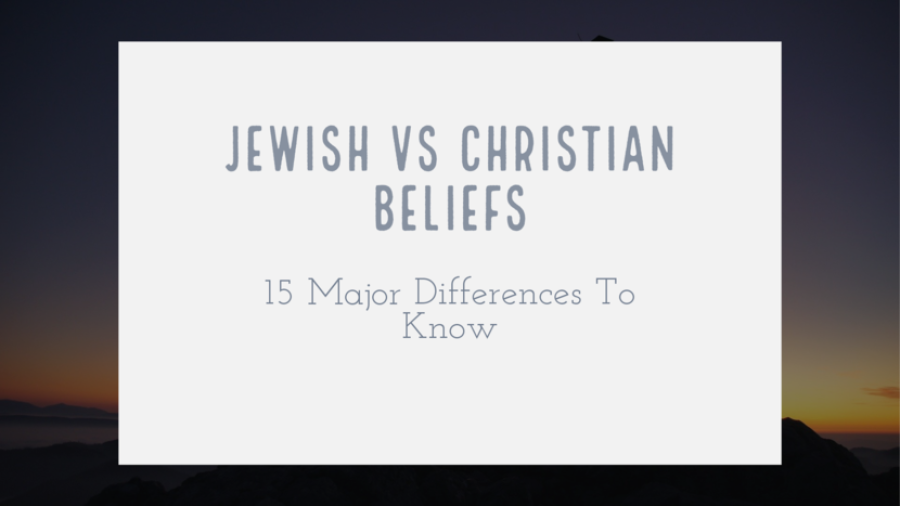Judaism and Christianity are both monotheistic, ancient religions. Despite their commonalities, Judaism and Christianity are different. Christians accept Jesus as the Messiah and savior, unlike Jews. Jewish theology accepts Jesus as a prophet, not the Messiah. Let’s look at the key differences between the two religions.
What is a Christian?
A Christian is a person who puts their faith for salvation in Jesus Christ alone. As the Son of God and part of the Trinity, Jesus is the only accepted Messiah and Lord. Faith alone justifies a Christian and saves them from the punishment of sin (Romans 5:1). Furthermore, a Christian follows the commandments of God and tries to become Christ-like.
What is a Jew?
A Jew is a member of the tribe of Judah, an Israelite, a member of a nation in Israel from the 6th century B.C. to the 1st century A.D., a descendant or convert of the ancient Jewish people, and a follower of Judaism. They follow the same God as Christians but only follow the Old Testament of the Bible and do not accept Jesus as the Messiah. Instead, they are still waiting for the Messiah to arrive.
All elements of Jewish life are governed by Leviticus’ 613 laws. Exodus 20:1-17 and Deuteronomy 5:6-21 summarize the Law in the Ten Commandments. According to Judaism, the Messiah will return to Israel and gather Jews. The dead will rise then. Furthermore, the Jewish are God’s chosen people. Jews were not chosen to be better than others; they were chosen to be a blessing to all nations.
Types of Judaism
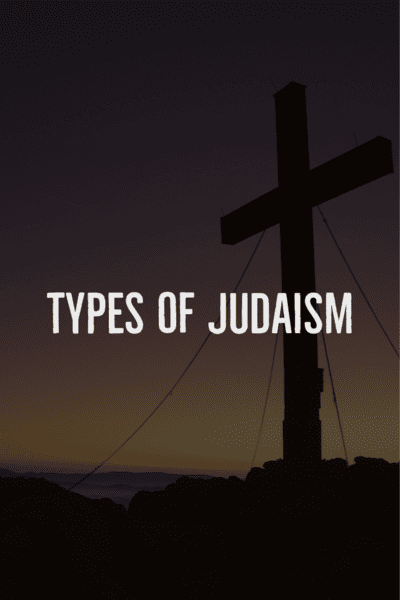
Jews treat Jewish traditions, laws, and rituals differently. Reform, Conservative, Orthodox, and Reconstructionist are significant American Judaism streams. Orthodox subgroups include ultra-Orthodox or Haredi Orthodox, centrist Orthodox, and Modern Orthodox. Many Jews are nondenominational, trans-denominational, post-denominational, or just Jewish.
Brief History of Christianity and Judaism
Christian Adam and Eve’s disobedience brought sin and death into the world (Genesis 3). After this, everyone sinned against God (Romans 3:23), but God had a solution. God sent Jesus, born of Mary, to die for the world’s sins (Luke 1:26-38). Jewish leaders urged the Romans to crucify Jesus (Mathew 27). His Roman killers confirmed His death (John 19:31-34, Mark 15:22-47).

Romans 6:23 says sin’s wages are death, but God’s gift is eternal life in Christ Jesus.
Jesus rose three days after dying (Matthew 28). His resurrection gives hope to all who trust in Him. (6:14). After Jesus’ ascension, 120 disciples prayed. Ten days later, fire-like tongues appeared and rested on each of them. And they were all filled with the Holy Spirit and began to talk in different languages (Acts 2:2-4)
The disciple preached, and 3000 people believed that day. They taught about Jesus, and thousands believed. From Jerusalem, God’s Church grew and spread over the world.
Jewish Judaism dates back to 2000 B.C. when God invited Abraham to follow Him. God told Abraham that he would be the father of a great nation and that his descendants would inherit Canaan if he followed Him. God revealed his purpose in the Old Testament and made promises to Moses, David, and the prophets.
God’s aim was to undo many of the repercussions of the fall of Adam and Eve following their disobedience in Eden, which separated mankind from God. Through Moses, God gave Israel the Law, and the promises were contingent on obedience. To Jews, the Law is the Torah, which includes the written Law (the Old Testament) and the oral Law Jews believe Moses passed down. The 10 Commandments are the best-known of the Torah’s 613 commands.
Israel never kept her side of the bargain and obeyed God’s commandments. As a result, Israel acquired possession of Canaan (today’s Israel), but they rebelled against God and were deported to Babylon. God sent prophets to warn the people of their transgression and remind them of his promises.
They emphasized that the exile would not stay forever because God would rescue His people, and that afterward, they might obey God and not be judged again. This is where the promise of a messiah comes in to fulfill God’s promises.
Israel waits for the Messiah in the Old Testament. Christians and Jews agree to this point and then separate in their belief in the Messiah.
Founders of Christianity and Judaism
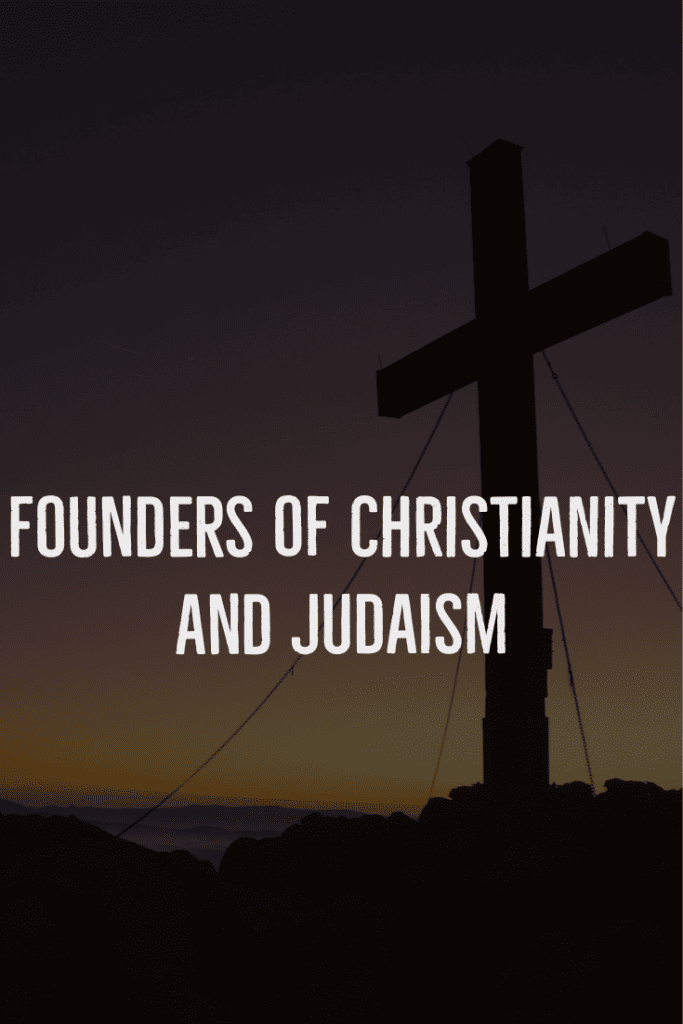
Christian Jesus is the cornerstone of Christianity; a Christian follows Christ. Jesus, Peter, or Paul did not form a separate religion from Judaism. Accepting Jesus as the Messiah led to the split of two churches. While many accept Paul as the founder of Christianity, he mentioned disciples before he converted and he was, in fact, persecuting Christians (those who followed Jesus Christ).
In Matthew 16:18, Jesus told Peter, “And I tell you that you are Peter, and on this rock, I will build my church.” According to this verse, Jesus formed the Church and selected Peter as its first leader. However, Eastern Orthodox and Protestants disagree that Peter had more authority than Paul or the other apostles.
Jewish Abraham was the first Jew or man to whom God spoke. God promised Abraham and his descendants they would live eternally in Canaan if they followed his rules. God ordered every Jewish male to be circumcised at birth as a sign of this covenant.
View of Sin between Christianity and Judaism
Christian Adam’s sin made everyone a sinner, and the punishment is death in hell. Jesus did what we could not: He kept God’s Law flawlessly and was holy and righteous. He took the world’s sins and sin’s wrath and cursed on the cross. God made Christ, who never sinned, our sin offering so we can be made straight with God through faith in Christ. Christ’s followers are saved from sin and hell. When we believe in Jesus, the Holy Spirit gives us the power to fight sin. They also believe in original sin, as in sin came into the world through Adam, and now everyone born is born with sin.
Jewish Any of Judaism’s 613 commandments is a sin. Judaism argues that sinning is part of life because there is no perfect human and everyone has an inclination to commit evil from youth. In Judaism, everyone is born sinless. This differs from the Christian doctrine of original sin, which holds that humans are stained by sin from conception and must be redeemed by faith. Jews believe sin originates when human instincts go wrong.
Beliefs about the Person of Jesus Christ

Christian Jesus came to Earth as a man to redeem sinners. Jesus said, “I am the resurrection and the life; whoever believes in Me will live, even if he dies, and whoever lives and believes in Me will never die.” (John 11:25-26) Jesus rose body and spirit so that mankind could join him in eternal salvation. But first, Jesus had to be both fully man and fully God to save us from the punishment of sin.
Jewish The Jewish view of Jesus of Nazareth is that he was a normal Jewish man and, most likely, a preacher who lived in Israel when the Romans ruled it in the first century C.E. He and many other religious and nationalist Jews were killed by the Romans because they spoke out against the Roman government and its abuses.
Views of salvation between Christians and Jews
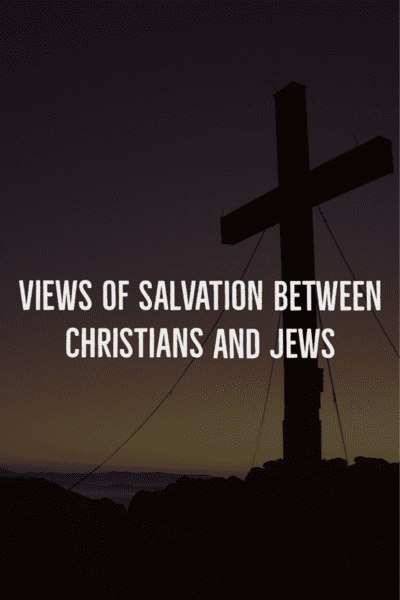
Christian Salvation means being saved from sin, and Christians believe that salvation is necessary to have a relationship with God on Earth and to spend eternity with God in Heaven.
Jewish In Judaism, salvation is closely linked to the idea of redemption, which means being saved from things or situations that take away from the value of life. God, as the universal spirit and maker of the world, is the only way for people to be saved, as long as they honor God by following his rules.
Views of the Trinity
Both Judaism and Christianity have different ideas about what God is like as a divine being. Christians think of God as the Holy Trinity, which comprises the Father, the Son (Jesus), and the Holy Spirit. Christians think that Jesus took on human form. Judaism is based on the idea that God is a single, all-powerful being with no other parts.
Jewish Vs Christian Holy Books
Christian The Bible, which contains both the Old and New Testaments, is the holy book of Christianity. God inspired the Bible, and this book holds all the tenants of Christian faith and instruction.
Jewish The Torah, or the Five Books of Moses, the Nevi’im, the books of the Prophets, the Ketuvim, and other writings, are all in the Hebrew Bible. The Bible was first written on scrolls, but around the 7th century, it also began to be written in books. The Talmud (literally, “study”) refers to the works that comment and expand on the Mishnah (“repeating”), the first rabbinic law treatise produced approximately 200 CE by Rabbi Judah the Prince in Israel.
Jewish and Christian practices

Christian Depending on the type of Christianity, practices may include baptism, the Eucharist (Holy Communion or the Lord’s Supper), prayer (including the Lord’s Prayer), confession, confirmation, burial rites, wedding rites, and religious education for children.
Jewish Judaism focuses on obedience to the Law. They seem to provide a complete guide to life, controlling a person’s relationships with God and others. Under the Law, they are required to keep a certain diet, keep the Sabbath Day, Old Testament Festivities such as the Passover and Yom Kippur, and all other Jewish traditions as stated in the Talmud.
The goal of Christianity vs Judaism
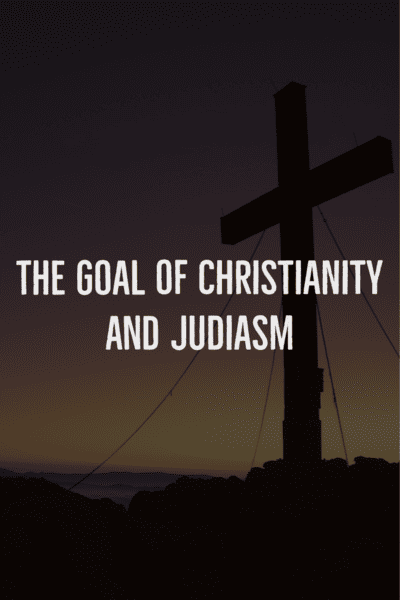
Christian The main goal in life, according to an old catechism, is to exalt and enjoy God forever. Additionally, Christians hope to be redeemed of sin and gain eternal salvation in Heaven with God and Jesus.
Jewish Messianism, or the notion of a global, political universe of justice and peace—has historically served as a vehicle for the universal aspiration of the Jewish people.
How does the Christian and Jew view life after death?
Christian Christian end-time expectations are for the church and the individual believer. They believe they will meet Christ in the air when he returns to spend eternity in Heaven, created on Earth. Additionally, Christians believe they will wait for the return of Christ in paradise (Luke 23:43).
Christians believe Jesus’ death and resurrection are God’s plan for humanity. Jesus’ death on the cross pays for humanity’s sin and restores its connection with God. Jesus’ sacrifice defeated sin and death. Believers in Christ who live excellent lives will have eternal life in Heaven. All mankind who refuse to accept Jesus as their Lord and Savior will spend eternity in hell.
Jewish Jewish texts from every age describe an afterlife. Sheol is the biblical underworld. It is called yeshiva shel mallah, the school on high, in rabbinic tradition. Hebrew shamayim came to mean Heaven. Moreover, Heaven is not a gated community. It is for righteous people of all faiths. Actions, not beliefs, define our fate. Jewish theology regards Heaven as a temporary afterlife home for spirits. They stay there until the Messiah’s return.
Additionally, Judaism has no Hell but instead has Sheol, a place where the dead live a shadowy existence without the ability to worship God. It’s a place of continuous existence but away from God. Jewish views of the afterlife are as diverse as Judaism itself, however. From the conventional view of a resurrected body to the thought that we live on in our children and grandchildren to a sense of Heaven.
Religious symbols
The Star of David is Judaism’s most recognizable emblem. For Christians, the cross serves as their emblem.
Can you be a Jew and Christian?

People of various ethnicities, cultures, and races can be Jewish, as they are Jewish-born. However, people born of Jewish descent cannot worship both God and the Law of the Old Testament while worshipping God and Jesus of the New Testament. In Christianity, Jesus fulfills the Law and sets a new covenant by which people can gain salvation. Nevertheless, the Jewish faith still maintains the necessity of the Law and refuse Jesus as the Messiah.
Proof that Jesus is the Messiah
Jesus fulfilled over three hundred prophecies in the Bible about the coming Messiah. Even fulfilling eight would be an astronomical feat, and yet he fulfilled them all. Here are just a few proving him as the Messiah:
Micah 5:2: Messiah would be born in Bethlehem.
Genesis 49:10: Messiah would be from Judah.
Zechariah 9:9 says Messiah will ride an ass.
Psalm 22 predicts Messiah’s terrible death.
Daniel 9:24-27 says Messiah would come before the Second Temple’s destruction.
Messiah’s life would include hardship, quiet at his arrest and trial, death in a rich man’s tomb, and resurrection: 53:12
I am Jewish, why should I become a Christian?
Yeshua fulfilled over 300 messianic prophesies over 2000 years ago. And yet Yeshua ushered in the Kingdom of Heaven if the Jews had accepted His atonement for sins. Even though they possessed the Hebrew Scriptures with 300 descriptions of who G-d will be, they missed Him. The Good News of God’s Kingdom spread to the Gentile world, and for 2000 years, Jew and Gentile have united together in Mashiach, looking forward to His soon return as reigning King, exactly as the rabbis have always expected.

Furthermore, the Temple has been gone since 70 A.D. The Temple was so important to the Jewish religion that it is hard to understand how important it was today. Many Jews thought the only way to eliminate sin was to bring a sin offering to the Temple. Without this kind of forgiveness, the sinner was doomed to be cut off from God, which is the same as being cut off from reality. But the way to sacrifice was no longer open.
Accepting Jesus allows you to be forgiven of your sins and to follow God as Yeshua was the promised sacrifice. No other man on Earth, past, present, or future, will be able to fulfill the Torah prophecies. The sheer fact that the genealogy led to Yeshua through both lines of his earthly parents to David, Avraham, and back to Adam and Havah should provide sufficient genealogy to follow the Messiah God appointed.
The Mashiach will be a great political leader whose family tree goes back to King David (Jeremiah 23:5). People often call the Mashiach “Mashiach ben David” (Mashiach, son of David). He will know a lot about Jewish Law and follow all of its rules (Isaiah 11:2-5). He will be a charismatic leader who makes people want to do what he does. He will be a great general who will lead Israel to victory in battles. He will be a good judge who does the right thing (Jeremiah 33:15). But most of all, he will be a person, not a god, a demi-god, or something else from another world. Yeshua fulfilled all of these requirements proving his place as the Son of God.

